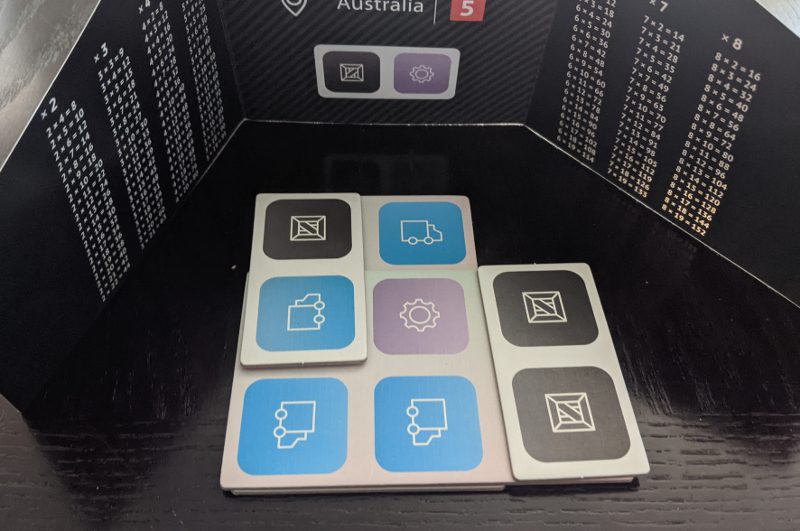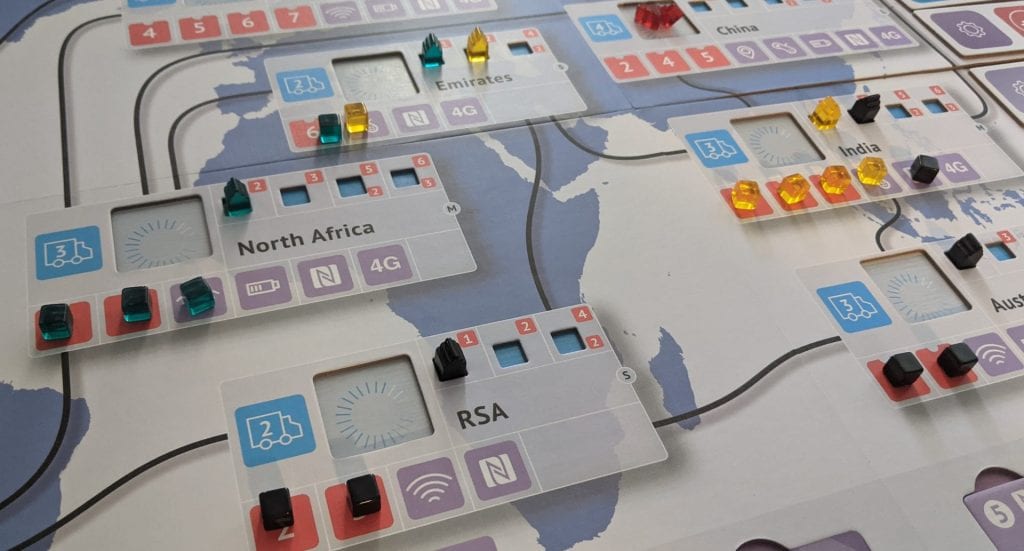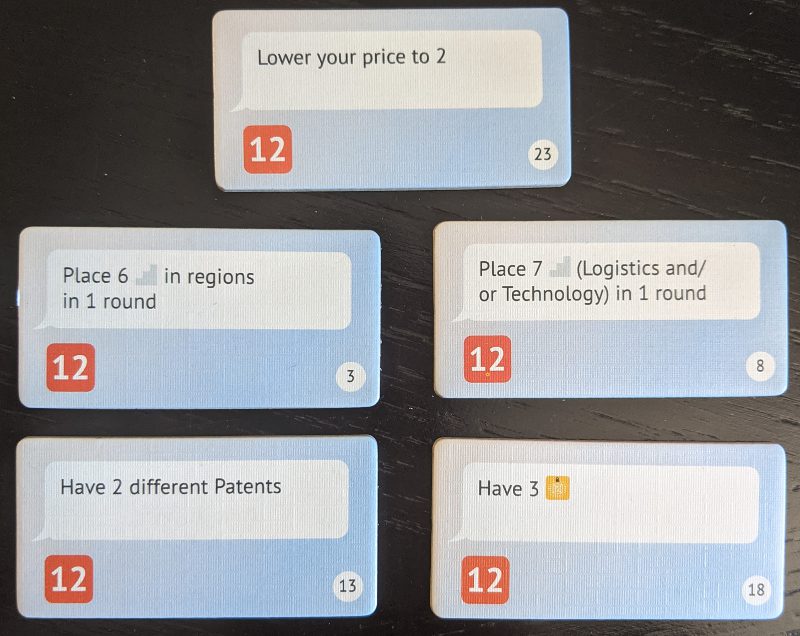Economic games aren’t my forte. It’s not because math is hard, it’s just my career deals with numbers, and I prefer to spend my limited free time on something that doesn’t remind me of work. However, I’ve heard this game is easy to get into, and as a millennial, it’s a theme I can easily consume.
In Smartphone, you’re a CEO of a startup company, and you have five rounds to cannon your company into dominance by earning the most points. To get these points, you will need to sell your phones, research technology, and dominate the global markets.
Same Thing We Do Every Night
In the middle of the playing area is a beautiful looking dual-layered map of the world showcasing regions. These regions are places you can sell your phones and their list of market demands, such as the highest price points or specific technologies. You can only operate in a region if you have an office in that region and your player color determines your starting location.
Each round goes through a series of phases. During the first phase, everyone will plan their moves simultaneously behind their shields. You do this by using two 3×2 pads in front of you that are littered with icons. Tiles are arranged on top of each other either parallel or perpendicular to form orders. Every icon represents one of the phases and with more icons, you can do more when that phase occurs.
Usually, I would issue a restraining order on games with spatial puzzles like this, yet I find it weirdly engaging here. Wrestling with the constraints is enjoyable, especially when these icons set the foundations for the rest of the round. Once everyone has programmed their moves, lift the shields, and everyone proudly displays their decisions or groans at their opponents’. Sometimes it can be both.

Purchasing Your Black Mirror
After Planning is Pricing. The prices will adjust, and these adjustments determine turn order in the remaining phases with the lowest price going first. As you will learn quickly, this is an important rule.
Production is where you produce your phones, as represented by cubes. Grab them and put them into your warehouse. After Production, you need to grab an Improvement tile. These tiles give you flexibility during the Planning phase by giving you more icons for your two pads.
Of course, since this is a game about technology companies, we need to research some tech. There are six technologies you can go for, tempting you with a rule-breaking ability. Some of them are more powerful than others, and getting them requires more work. In addition, if you are the first to get the tech, you gain victory points since patents are a thing.
Ending The Battle
So far, so good. Cell phones are in the warehouse, innovations are in the works, and prices are set. This doesn’t mean much if the world doesn’t know you exist, and that’s where Logistics comes in. It’s here where you plant your office buildings in neighboring regions, either setting new ground or intruding on an opponent’s turf. More regions, more wallets to take.
After expanding, it’s time to drain out the warehouses by selling phones. It is at this point where the turn order punches your shoulder to remind you how bloody important it is. When it is your turn, you will sell all your phones, one region at a time. You pick a region, sell as many cubes as you can according to their market needs, and move on to the next. The regional market demands can only be satisfied once, so players who take their turn earlier can block you. Too bad, so sad.
Just to add more aggravation spice to this bitter soup, each region will also score additional points to the players who have the most cubes in that region. The game calls this Market Dominance; I call it pain.
To signal the end of the round, remove the cubes from the map, reset the prices back to 5, unsold phones are discarded, and a new round begins. Do this four more times, and the game ends.

Challenging The Status Quo
As crude as this sounds, I can’t help but think Smartphone is flipping the bird at the economic genre here. For once, math isn’t the center of the universe. Come to think of it, the number-crunching in Smartphone is more based on guessing what other people are doing than logic, and this is by design.
Unlike other economic or strategy games, turns do not hop between players simply reacting to their opponents. The structure focuses on players trying to mind read each other and planning for the entire round. It’s not to say that what you planned cannot be swayed, but like a downhill bike ride, once the momentum kicks in, it’s hard to change direction.
I’ve heard some complaints about this, but I have to raise one of my eyebrows in protest. Not every strategy game needs to follow a specific formula, and Smartphone urging players to outguess their friends before their plans play out is a refreshing change. It reminds me of my days when I started Fencing, where I was taught the sport was more about reading your opponent with quarter-second decisions.
Instead of focusing on my opponent’s footwork or blade movements, I examine the regions they occupy and the technology they possess. There are few better feelings in gaming than reading your friends. When those shields lift and you guessed correctly, endorphins rollercoaster through your body followed by a well-earned fist pump.
Streamlining The Complexity
I find the most surprising aspect of this game is that while all these decisions are fascinating to dwell on, there is a simple system behind them. At its core, the game is about setting your pads to program your moves for the round, with each phase slowly peeling a layer of everyone’s plan one step at a time. It is an easy game to teach that I can introduce to people who aren’t typical gamers. I will even plant a flag and declare that this is a suitable alternative to the eternal cliche that is Settlers of Catan. At least, if you are playing 4 or 5 players, but with 2 or 3? We need to talk.
Whatever the player count, the map will always be the same. To funnel players into conflict, Retailers are thrown in. Regions with a retailer can still have an office, but you can’t sell phones there. In its place, you will receive a rule-breaking benefit that can assist you with your overall plan. It sounds interesting, but it’s a limp-wristed effort at best. The main enjoyment from this game comes from players competing in regions with price wars, and the Retailers do little to encourage that.
That’s where 1.1 expansion comes in.
The Patch Notes
This is a module-based expansion, meaning you mix and match different systems to the base game. Probably the most noticeable one is the new three-player map. In it, three starting locations are spitting distance from one another on a map of North America. This new dynamic certainly addresses my issue with the main game about players not engaging, as players will bump heads and complain about personal space as if they were ending a date in a Smart car.
Another interesting module is the Directives. These are public objectives that earn you some extra victory points if you achieve them. It’s one of those “first come, first serve” types of situations where only one player can claim an objective, making the entire experience feel like a race. Like all the modules in this expansion, this one is for advanced players in mind. What I like about this is it challenges the natural flow of the original game. Planning and countering your opponents were already important aspects of the game, but now you have to incorporate these Directives into your plans as quickly as possible.

You also get a new set of Technologies in this expansion, although they aren’t just mere alternatives. The rulebook says that these technologies are big game changers, and it isn’t messing around with that statement. Some of them throw in new components like the Mini improvements tiles, while two of them introduce a CEO piece that travels around the map doing CEO things. I would unmistakably only use this for advanced players. The Directive module is at least understandable at first glance, something I can’t say the same about the new tech. Still a fantastic addition to the game.
The fourth and final one is the Hardcore module. I’m going to be blunt and say outright that I didn’t bother with this one. As I’ve said in the second sentence in this review, I am not a big fan of dealing with an avalanche of math in my games. In the base game, the only thing you had to be concerned about was the number of cubes multiplied by the price, and the player screens provide you with a handy multiplication table. Here? You now throw other nonsense into the formula, such as each phone requiring you to pay 1 point or “loan interest” if you have negative points. I’m sure the players who enjoy the “classic” economic gameplay will like this as they stroke their blue bookshelf version of Acquire. Not for me.
Smartphone was a big surprise for me. Despite hearing good things about the game, I wasn’t expecting it to grab my attention and whisper sweet nothings into my ear. It’s an economic game for people who don’t like economic games. People can follow the rules easily, the flow of the game makes sense, and there is enough tension to keep the players hooked until the end. If it wasn’t for the crippling player scaling problems in the base game, I would say this is perfect. Any diamond, regardless of its flaws, is still a diamond.












Add Comment